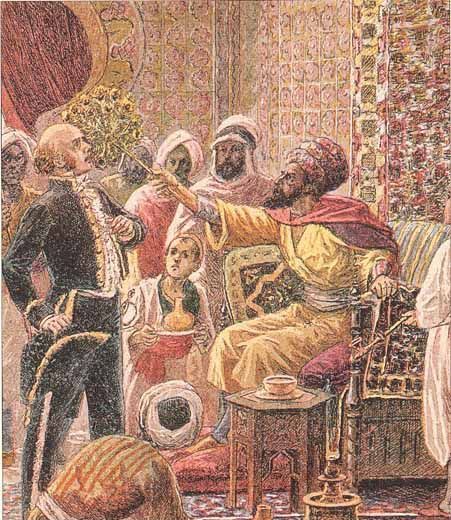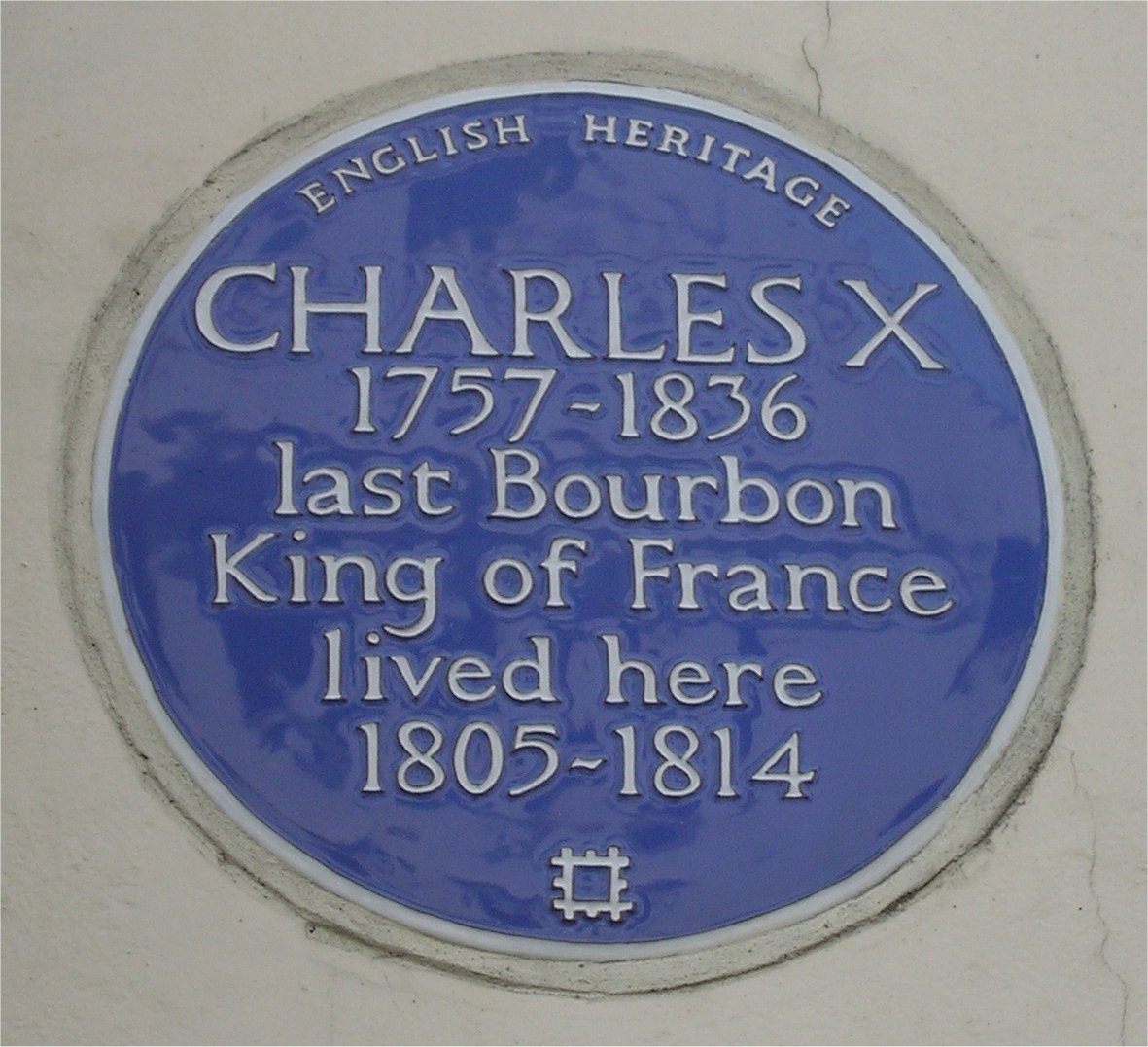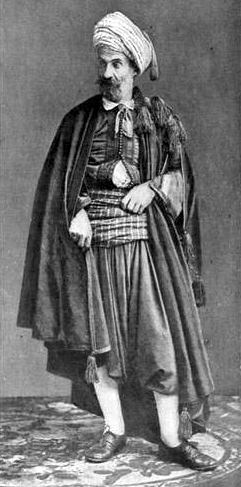|
Hussein Dey (ruler)
Hussein Dey (real name Hüseyin bin Hüseyin; 1765–1838; ) was the last Dey of the Deylik of Algiers. Early life He was born either in İzmir or Urla in the Ottoman Empire. He went to Istanbul and joined the Canoneers (Topçular in Turkish), and quickly rose to the rank of Odabaşı, but thanks to his character and rivalries, he was forced to flee the Ottoman Empire. He fled to the Deylik of Algiers, a country which was de facto independent from the Ottoman Empire, similar to the other countries of the Barbary Coast. Algiers was well known for accepting fugitives of different countries. There, he joined the Odjak of Algiers and became a Janissary. In 1815 he was appointed Khodjet al-khil, a minister tasked with raising and commanding the cavalry of the Dey and raising taxes. He commanded the cavalry as a quick relief force during the bombardment of Algiers in 1816. In 1818 following the death of the previous Dey, the Divan of Algiers elected Hussein as the next ruler. ... [...More Info...] [...Related Items...] OR: [Wikipedia] [Google] [Baidu] |
Pasha
Pasha (; ; ) was a high rank in the Ottoman Empire, Ottoman political and military system, typically granted to governors, generals, dignitary, dignitaries, and others. ''Pasha'' was also one of the highest titles in the 20th-century Kingdom of Egypt and it was also used in Morocco in the 20th century, where it denoted a regional official or governor of a district. Etymology The English word ''pasha'' comes from Turkish language, Turkish ('; also ()). The Oxford English Dictionary attributes the origin of the English borrowing to the mid-17th century. The etymology of the Turkish word itself has been a matter of debate. Contrary to titles like emir (''amīr'') and bey (sir), which were established in usage much earlier, the title ''pasha'' came into Ottoman Empire, Ottoman usage right after the reign of Osman I (d. 1324), though it had been used before the Ottomans by some Anatolian beyliks, Anatolian Turkish rulers of the same era. Old Turkish had no fixed distinction betwe ... [...More Info...] [...Related Items...] OR: [Wikipedia] [Google] [Baidu] |
Odjak Of Algiers
The "Odjak of Algiers" (also spelled ''Ujaq'') was a unit of the Regency of Algiers, Algerian army. It was a highly autonomous part of the Janissary Corps, acting completely independently from the rest of the corps, similar to the relationship between Algiers and the Sublime Porte. Led by an Janissary Agha, Agha, they also took part in the country's internal administration and politics, ruling the country for several years. They acted as a defense unit, a Praetorian Guard, and an instrument of repression until 1817. The Odjak of Algiers was a faction in the country which encompassed all Janissaries. Its main institution was the ''diwân of Algiers'' which was established in the 16th century by Hayreddin Barbarossa and seated first in the , then at the Palace of the Dey, kasbah citadel. This assembly, initially led by a janissary Agha, evolved from a military body, the Odjak of Algiers, into the country's primary administrative institution. The diwân held true power in the Regency ... [...More Info...] [...Related Items...] OR: [Wikipedia] [Google] [Baidu] |
Sidi Fredj
Sidi Fredj, known under French rule as Sidi Ferruch, is a coastal town in Algiers Province, Algeria. It is located within the territory of the Staouéli, municipality of Staouéli, on a presque-isle on the Mediterranean Sea. Obori was important enough in the Roman province of Mauretania Caesariensis to become one of the many suffragans of its capital Caesarea Mauretaniae's Metropolitan Archbishopric, but faded like most sees in Africa (Roman province), Roman Africa. Sidi Fredj was the landing spot where the French established their beachhead for the Invasion of Algiers in 1830. A number of ships of the French Navy were subsequently named ''Sidi Ferruch'', the colonial name of the town under French rule, in honour of the event. * See also *List of lighthouses in Algeria * References External links GCatholic Populated coastal places in Algeria Cities in Algeria {{Algiers-geo-stub ... [...More Info...] [...Related Items...] OR: [Wikipedia] [Google] [Baidu] |
Fly Whisk
__NOTOC__ A fly-whisk (or fly-swish) is a tool that is used to swat flies. A similar device is used as a hand fan in hot tropical climates, sometimes as part of regalia, and is called a ''chowrie'', ''chāmara'', or ''prakirnaka'' in South Asia and Tibet. In Indonesian art, a fly-whisk is one of the items that is associated with Shiva. A fly-whisk is frequently seen as an attribute of Hindu, Jain, Daoist and Buddhist deities. The fly-whisk is evident in some configurations of the Ashtamangala, employed in some traditions of murti puja, particularly Gaudiya Vaishnavism. It is also used as an accessory in the ritual aspects of folk performance traditions, especially folk-theater forms like Pala, where it can double as a prop. Fly-whisks are in use in parts of the contemporary Middle East, such as Egypt, by some classes of society, ''e.g.'', outdoor merchants and shop keepers, especially in summer when flies become bothersome. Those have a wooden handle and plant fibers attached ... [...More Info...] [...Related Items...] OR: [Wikipedia] [Google] [Baidu] |
El Kala
El Kala (, ) is a seaport of Algeria, in El Tarf Province, 56 miles (90 km) by rail east of Annaba and 10 miles (16 km) west of the Tunisian frontier. It is the centre of the Algerian and Tunisian coral fisheries and has an extensive industry in the curing of sardines. The harbor is small and exposed to the northeast and west winds. El Kala attracts tourists from within and outside the country, especially during the summer. It is home to an exceptional ecosystem and was declared a biosphere reserve by UNESCO in 1990. History Thinisa in Numidia was an ancient city in the Roman province of Numidia. It was important enough to become a bishopric. The old fortified town was built on a rocky peninsula about 400 metres long, connected with the mainland by a sand bank. La Calle from the times of its earliest records in the 10th century was the residence of coral merchants. After the Umayyad conquest of North Africa in the late 6th century and early 7th century, the city becam ... [...More Info...] [...Related Items...] OR: [Wikipedia] [Google] [Baidu] |
Annaba
Annaba (), formerly known as Bon, Bona and Bône, is a seaport city in the northeastern corner of Algeria, close to the border with Tunisia. Annaba is near the small Seybouse River and is in the Annaba Province. With a population of about 263,650 (2019) and 1,000,000 for the metropolitan area, Annaba is the third-largest city and the leading industrial center in Algeria. Annaba is a coastal city that underwent significant growth during the 20th century. Annaba has a metropolitan area with a higher population density than the other metropolitan areas of the Algerian coastline, such as Oran and Algiers. Much of eastern and southern Algeria uses the services, equipment and infrastructure of Annaba. Economically, it is the centre for various economic activities, such as industry, transportation, finance, and tourism. Names Present-day Annaba grew up on the site of Aphrodisium, the seaport of the Roman Empire, Roman city . (The modern city has since expanded south over Hippo's ruins ... [...More Info...] [...Related Items...] OR: [Wikipedia] [Google] [Baidu] |
Pierre Deval (diplomat)
Pierre Deval (1758–1829) was French Consul-General in Algeria from 1814 to 1827. He is known for his diplomatic mission to the Regency of Algiers, and the diplomatic slights he received while there, which gave a pretext to the French invasion of Algiers in 1830. Deval was a member of a family which provided dragomans to the French diplomatic services to the Ottoman Empire since 1716. During the Napoleonic Wars, the Regency of Algiers had greatly benefited from trade in the Mediterranean, and of the massive imports of food by France, largely bought on credit by France. Deval visited the Dey of Algiers 29 April 1827. Hussein Dey, Algeria's Ottoman ruler, demanded that the French pay a 28-year-old debt, contracted in 1799 by purchasing supplies to feed the soldiers of the Napoleonic Campaign in Egypt. In the "Bacri-Busnach affair" in 1797 two Jewish traders of Algiers, Bacri and Busnach, had sold for 14 millions of wheat to the French Republic, which were never paid back. Huss ... [...More Info...] [...Related Items...] OR: [Wikipedia] [Google] [Baidu] |
Bakri-Busnach Affair
The Bakri-Busnach affair (French: L'affaire Bakri-Busnach) is the name of a commercial–political conflict between France and Algeria in the early 19th century; it centered on France's obligations to a commercial company owned by the Algerian Jewish families of Bakri and Busnach (Bekri and Bouchnaq). The affair is considered one of the causes of the French invasion of Algeria in 1830. Background During the 17th century, Jewish immigrants from Livorno, Italy, arrived in northern Algeria. These immigrants, who were the descendants of deportees from Spain, settled in North Africa as traders, in search of economic opportunities. Soon they became a significant factor in the international trade of Algerian cities. They provided important financial and commercial services to the Dey (the local ruler of the Ottoman Empire), and some of them were appointed over the years to serve as the "early" mediator between the Algerian Jewish community and the government. Two of the senior fa ... [...More Info...] [...Related Items...] OR: [Wikipedia] [Google] [Baidu] |
Charles X Of France
Charles X (Charles Philippe; 9 October 1757 – 6 November 1836) was King of France from 16 September 1824 until 2 August 1830. An uncle of the uncrowned Louis XVII and younger brother of reigning kings Louis XVI and Louis XVIII, he supported the latter in exile. After the Bourbon Restoration in France, Bourbon Restoration in 1814, Charles (as heir-presumptive) became the leader of the ultra-royalists, a radical monarchist faction within the French court that affirmed absolute monarchy by Divine Right of Kings, divine right and opposed the constitutional monarchy concessions towards Classical liberalism, liberals and the guarantees of civil liberties granted by the Charter of 1814. Charles gained influence within the French court after the assassination of his son Charles Ferdinand, Duke of Berry, in 1820 and succeeded his brother Louis XVIII in 1824. Charles's reign of almost six years proved to be deeply unpopular amongst the liberals in France from the moment of Coronation of ... [...More Info...] [...Related Items...] OR: [Wikipedia] [Google] [Baidu] |
History Of The Jews In Algeria
The history of Jews in Algeria goes back to Antiquity, although it is not possible to trace with any certainty the time and circumstances of the arrival of the first Jews in what is now Algeria. In any case, several waves of immigration helped to increase the population. There may have been Jews in Carthage and present-day Algeria before the Roman conquest, but the development of Jewish communities is linked to the Roman presence. Jewish revolts in Israel and Cyrenaica in the 1st and 2nd centuries certainly led to the arrival of Jewish immigrants from these regions. The vast majority of scholarly sources reject the notion that there were any large-scale conversions of Berbers to Judaism. The Muslim conquest of North Africa, which was completed in Algeria in the 8th century, brought North Africa into the realm of Islamic civilization and had a lasting impact on the identity of local Jewish communities, whose status was henceforth governed by the dhimma. New immigrants later ... [...More Info...] [...Related Items...] OR: [Wikipedia] [Google] [Baidu] |
Ali V Ben Ahmed
Ali V Ben Ahmed, nicknamed Ali Khodja, Ali-Meguer, or Ali Loco (the mad) (Arabic: علي ابن أحمد خوجة) was a Kouloughlis, Kouloughli of partial Georgia (country), Georgian (Mingrelians, Mengrelian) and Native Algerian origins born in Algeria. He was the dey of Algiers, dey of the Deylik of Algiers from September 1817, just after the assassination of his predecessor Omar Agha the 8th. He remained so until his death in March 1818. His sobriquet ''Ali-Meguer'' may indicate his Mingrelians, Mingrelian background. Early life He was complicit in the assassination of Ahmed bin Ali Khodja in 1808, and the assassination of Omar Agha (1817). He served in various important positions before being elected Dey in 1817. Rule A few days after his arrival, and to better ensure his safety, he left the Djenina Palace located in the lower part of the city of Algiers and offering small defenses to move to the Casbah of Algiers, casbah, where he put the treasury safe. Using his connec ... [...More Info...] [...Related Items...] OR: [Wikipedia] [Google] [Baidu] |






